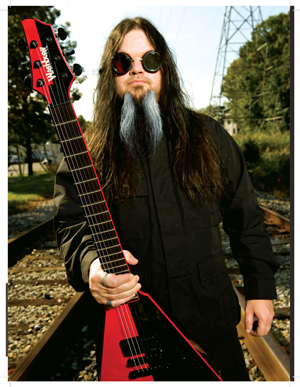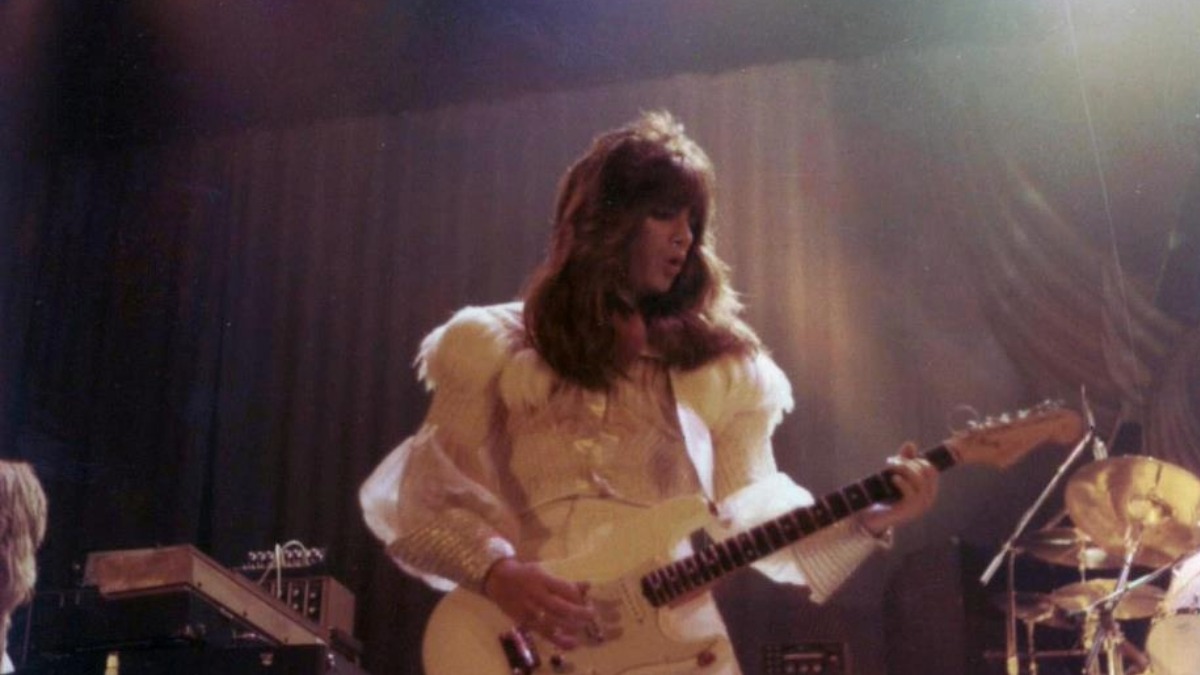Mudvayne: Inside Track
All the latest guitar news, interviews, lessons, reviews, deals and more, direct to your inbox!
You are now subscribed
Your newsletter sign-up was successful

Originally published in Guitar World, March 2009
Mudvayne's Greg Tribbett gives an exclusive look into the band's latest release, The New Game.
"We've never tried to please the radio programmers, because radio has been behind us since day one,” says Mudvayne guitarist Greg Tribbett. “In fact, they came to us the first time, when we initially put ‘Dig’ out,” he adds, referring to the band’s 2000 debut single, “and it took off. We just do what we do—just like we say in our new single, ‘Do What You Do.’ ”
As any radio listener knows, “Do What You Do” is the runaway success from Mudvayne’s latest release, The New Game (Epic). Their first studio album in three years, and their fifth overall, it finds the band teamed with producer Dave Fortman once again. Fortman, whose credits include albums for Slipknot, Evanescence and Simple Plan, manned the desk for Mudvayne’s previous release, 2005’s Lost and Found, which included the Number One smash hit “Happy?” and also produced some of the tracks on the band’s 2007 compilation album, By the People, for the People.
The New Game is the latest installment in what has been a consistently successful catalog. Mudvayne’s first major-label release, 2000’s L.D. 50,featured the hit song, “Dig.” The End of All Things to Come, from 2002, contained the hit “Not Falling,” while Lost and Found spawned “Happy?” and received a 2005 Grammy nomination for Best Metal Performance.
To coincide with the release of The New Game, Mudvayne have launched a twisted contest on their website, wherein fans are invited to solve a fictional and brutally dark murder mystery. New clues to the story posted every week up until January 26. If you are a fan, the grand prize is pretty sweet: a Mudvayne VIP Laminate for Life.
Tribbett—who also participates in the metal supergroup Hellyeah with Mudvayne vocalist Chad Gray, ex-Pantera/Damageplan drummer Vinnie Paul, Damageplan bassist Bob Zilla and Nothingface guitarist Tom Maxwell—recently stopped in at the Guitar World offices to show off his new signature Washburn guitar, the WV66GT, and give us the lowdown on the band’s latest effort.
All the latest guitar news, interviews, lessons, reviews, deals and more, direct to your inbox!
GUITAR WORLD How did the material for The New Game come together?
GREG TRIBBETT The material was written in two different cities. One of the cities was Chicago, but we discovered that we couldn’t get anything done there because there are too many bars! So we had to move out to the middle of nowhere in Idaho just so we could concentrate. Actually, it was really cool, because we were way out in the country, and it was really isolated, which is how we prefer to do things when we write. But we woke up one morning and there was seven feet of snow outside, all the way up to the windows.
Normally, I’ll come up with some riffs, and me and Matt [McDonough, drummer] work out the drum beats; then Ryan [Martinie, bass] will listen first to what Matt and I have done before putting his bass parts together. Then we play together and take it from there. Most of the songs just develop in a natural way by themselves.
GW Did the band adopt a different musical approach for the material on The New Game?
TRIBBETT To me, the Mudvayne sound is definitely there, but I think there are some more “rock” vibes on this record. There’s a “metal” aspect as well as our usual strong melodies, but if you listen, you’ll detect a lot of intricacies, as is always the case with Mudvayne’s music. It’s just the way Matt, Ryan and I write together.
A good example is the title track: I came up with the main riff in my head, and when I first played it for Matt, he started playing a blast beat to it. When I heard that, I said, “Dude, we gotta keep that blast beat on there. Let’s figure this out right now.” And that’s how it happens with us—it’s always very spur-of-the-moment.
GW You guys occasionally incorporate unusual time signatures in your music, such as the verse section of “Not Falling” which features bars of 5/8 interspersed with straight 4/4.
TRIBBETT With us, it’s kind of weird, because sometimes all three of us will be playing completely different things. I mean, Matt might be playing in 15/16 while I’m trying to play a riff over it in 4/4, and Ryan is playing his bass part in some other time signature! It’s weird how it comes together, but we’ve been playing together for a long time now, and we also know how to write with each other. It really comes pretty easily for us. Some people might think it’s completely flipped out, but, to me, it seems natural.
GW How did the band develop such good chemistry?
TRIBBETT I think it comes from years of playing together, years of touring together and each of us knowing how to play live together. We play something like 150, 175 shows a year. I don’t think a new band will reach that kind of communication till they’ve been together for seven or eight years, if they can manage to stay together that long. A lot of bands don’t. But if they do, they’ll grow and mature together as a band, and the process gets easier with time.
GW How do you think the metal scene has changed since you guys first came out in 2000?
TRIBBETT It’s definitely changed since we first came out. We, of course, got the big stamp of “nu-metal” back then and got compared to a lot of bands of that genre. Then we got quarantined into the “math metal” thing. I don’t really understand where that came from. There are a lot of bands out there being tagged “math metal,” like Meshuggah, for example.
But, over time, I think we’ve stuck with our way of doing things, and on this new record you’ll hear some guitar solos, and you’ll hear me venturing out, instead of me just doing the same old thing. I know some people think that I can’t play solos, only rhythms! It’s a new thing for me to put guitar solos on a record, and I was stoked when I approached the band about doing it and it worked out well.
As a band, we are maturing and developing with each new record. And as far as the music business goes, I think everything is coming around in a big circle. You see the metal coming back with all of the real flashy leads and all of that stuff. Maybe that means the Eighties are going to come back. I don’t know, we’ll see! [laughs]
GW Do you always play in the same alternate tuning?
TRIBBETT Yes, it’s always drop C, which is, low to high, C G C F A D.
GW What gear did you use for the new album?
TRIBBETT For this new record, I used my signature Washburn WV66GT , plus a Telecaster for clean sounds. As far as amps go, I used a Roland Jazz Chorus for the clean sounds, which I also used for the acoustic guitars, and also Randall V2s. When doubletracking rhythm parts, I’d change the EQ a little from part to part to get a different tone. The only pedal I used was a wah, which I used for the solo on “Do What You Do.”
GW Is your live setup much different?
TRIBBETT No, it’s pretty simple, too. My pedal board is made up of an A/B box, a Line 6 digital delay and a Morley wah pedal. The A/B switches between two Randall heads, one of which is set to clean and the other one is dirty. Live, I use the RM100 heads, with which you can swap out three different preamp modules. So there’s a clean module and a dirty module, but now I use a “lead” module, too. I’m pretty “basic” when it comes to my setup; I don’t like a bunch of different gear and processors and all of that crap. When something works, you stick with it. And this is working. [laughs] Obviously.
